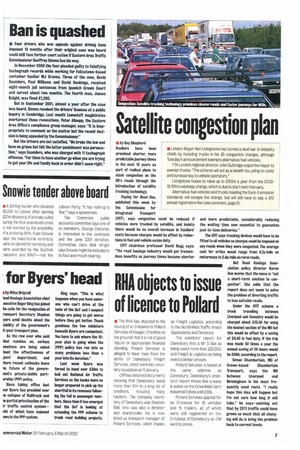Satellite congestion plan
Page 7

If you've noticed an error in this article please click here to report it so we can fix it.
• by Guy Shepherd
Hauliers have been promised shorter, more predictable journey times in the next 10 years as part of radical plans to slash congestion on the UK's roads through the Introduction of satellite tracking technology.
Paying for Road Use published this week by the Commission for Integrated Transport (Cf1T), says congestion vehicles were tracked by satellite, and insists there would be no overall increase in hauliers' costs because charges would be offset by reductions in fuel and vehicle excise duty.
CfIT chairman professor David Begg says: "The road haulage industry would get tremendous benefits as journey times became shorter could be reduced if and more predictable, considerably reducing the waiting time now essential to guarantee just-in-time deliveries."
The CflT says tracking devices would have to be fitted to all vehicles so charges could be imposed on any roads when they were congested. The average cost for antics would range from 8.7p/mile on motorways to 2.40,/mile on rural roads.
But Road Haulage Asso elation policy director Karen Dec warns that the move is "not a short-term solution to congestion". She adds that the report does not seem to solve the problem of diverting traffic to less suitable roads.
under the CM scheme a truck travelling between Liverpool and Coventry would be charged about £10.50 for using the busiest section of the M6 but this would be offset by a saving of 1940 in fuel duty. If the trip was made 50 times a year the annual saving of 29 hours would be 1600, according to the report.
Simon Chamberlain, MD of Crewe-based Chamberlain Transport, says the M6
between Liverpool and Birmingham is his most frequently used route. "I really hope this idea will happen but I'm not sure how long it will take," he says—pointing out that by 2011 traffic could have grown so much that all charging will do is bring the problem back to current levels.












































































































































